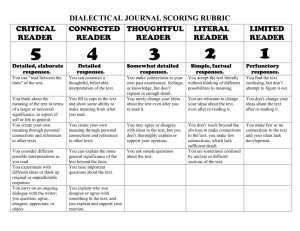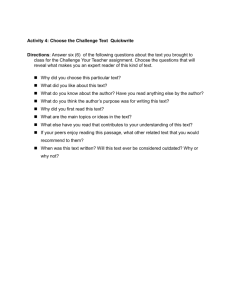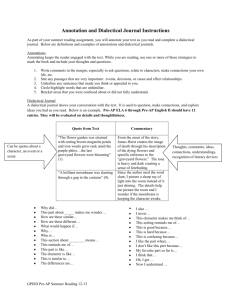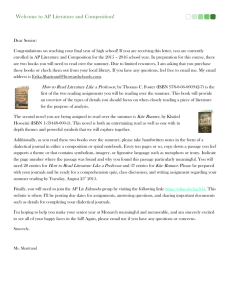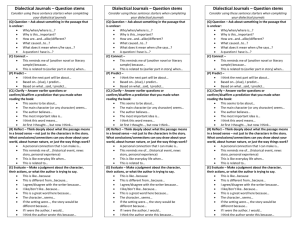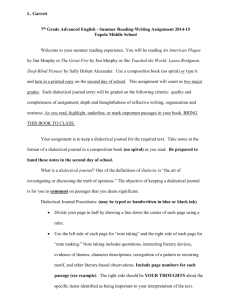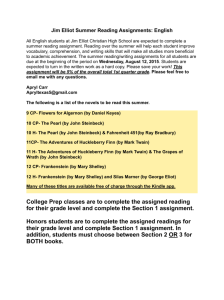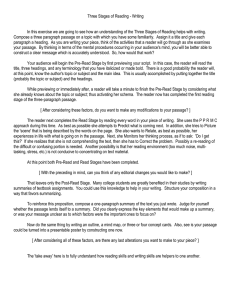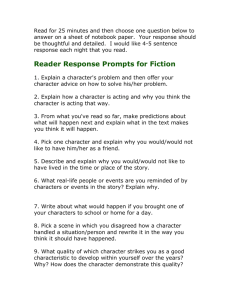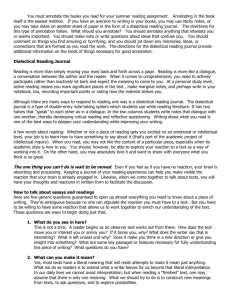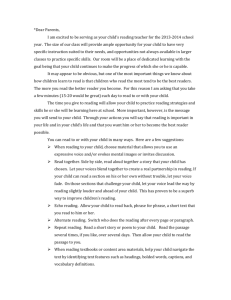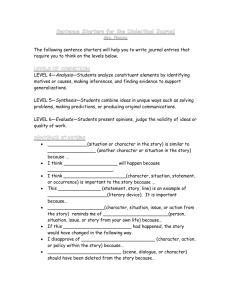DIALECTICAL JOURNAL SCORING RUBRIC
advertisement
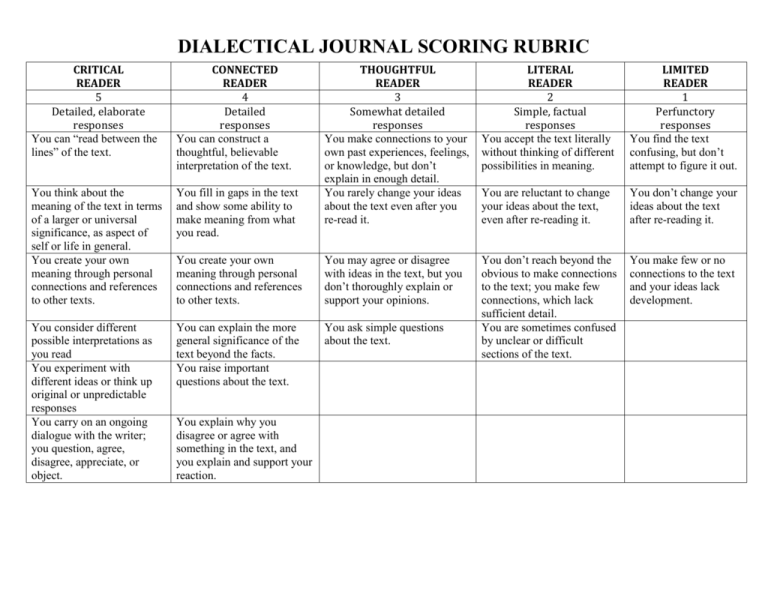
DIALECTICAL JOURNAL SCORING RUBRIC CRITICAL READER 5 Detailed, elaborate responses You can “read between the lines” of the text. CONNECTED READER 4 Detailed responses You can construct a thoughtful, believable interpretation of the text. THOUGHTFUL READER 3 Somewhat detailed responses You make connections to your own past experiences, feelings, or knowledge, but don’t explain in enough detail. You rarely change your ideas about the text even after you re-read it. LITERAL READER 2 Simple, factual responses You accept the text literally without thinking of different possibilities in meaning. LIMITED READER 1 Perfunctory responses You find the text confusing, but don’t attempt to figure it out. You think about the meaning of the text in terms of a larger or universal significance, as aspect of self or life in general. You create your own meaning through personal connections and references to other texts. You fill in gaps in the text and show some ability to make meaning from what you read. You are reluctant to change your ideas about the text, even after re-reading it. You don’t change your ideas about the text after re-reading it. You create your own meaning through personal connections and references to other texts. You may agree or disagree with ideas in the text, but you don’t thoroughly explain or support your opinions. You make few or no connections to the text and your ideas lack development. You can explain the more general significance of the text beyond the facts. You raise important questions about the text. You ask simple questions about the text. You don’t reach beyond the obvious to make connections to the text; you make few connections, which lack sufficient detail. You are sometimes confused by unclear or difficult sections of the text. You consider different possible interpretations as you read You experiment with different ideas or think up original or unpredictable responses You carry on an ongoing dialogue with the writer; you question, agree, disagree, appreciate, or object. You explain why you disagree or agree with something in the text, and you explain and support your reaction. February 12, 2015 Sophomore Class Pre-AP Dialectical Journal Assignment for Things Fall Apart Directions: Record in your notebook two dialectical journal entries for each chapter. You should do this on your own time or as time permits in the classroom. If you are assigned more than one Dialectical Journal (DJ), per reading section, you must complete more than one type of response. For example you can ask a question, and you can make a connection and analyze. You cannot simply ask 3 different questions; your entries must be three different types of responses. Sometimes I may assign you a specific type of response and a specific sentence stem along with it. Otherwise, use the guide below. Response Types: You must label your responses using the following codes: 1. (Q) Question – ask about something in the passage that is unclear 2. (C) Connect – make a connection to your life, the world, a another text, or between characters 3. (P) Predict – anticipate what will occur based on what’s in the passage 4. (CL) Clarify – answer earlier questions or confirm/disaffirm a prediction 5. (D)Discuss- Discuss the words, ideas, or actions of the author or character(s) 6. (E) Evaluate - make a judgment about what the author is trying to say 7. (A) Analyze - Analyze the text for use of literary devices (tone, structure, style, imagery) and the affect of the devices in the text or analyze a passage and its relationship to the story as a whole 8. (R) Reflect – think deeply about what the passage means in a broad sense – not just to the characters in the story/author of the article. What conclusions can you draw about the world, about human nature, or just the way things work? POSSIBLE SENTENCE STEMS This part of the text is confusing because… The author is trying to say that… This passage reminds me of a time in my life when… If I were (name of character) at this point I would… This part doesn’t make sense because… This character reminds me of (name of person) because… I really dislike/like this idea because… “Quote” (Author’s last name page number). “He was a man of action, a man of war. Unlike his father he could stand the look of blood. In Umofia’s last war he was the first to bring home a human head” (Achebe 7). Type(s) of response and the response. 3-5 sentences in length. (Discuss and Evaluate) Prior to colonization, Okonkwo is a symbol of power and masculinity. Unlike Unoka, who represents laziness and over all failure, Okonkwo’s strength is highly valued in the pre-colonial Ibo culture. The use of the words “blood” and “human head” show that physical combat is also an esteemed characteristic for an Ibo man to possess.
